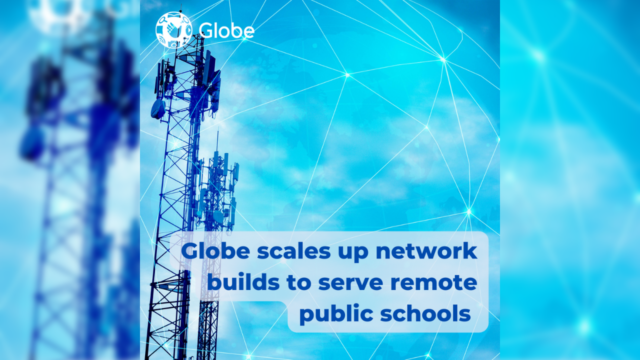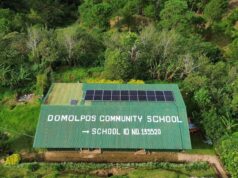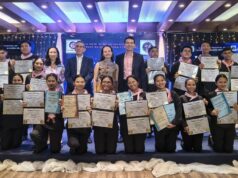Globe continues to scale up its network builds and upgrades, especially in geographically isolated, disadvantaged, and conflict-affected areas to help provide connectivity to 17,000 public schools that still do not have data or internet access.
This was shared by Michael Agustin, Director for Enterprise Sales of Globe, one of the panelists at the Industry Leaders Conference on Connecting Last Mile Schools organized by the United States Agency for International Development (USAID) through All Children Reading Philippines (ACR-Philippines), Better Access and Connectivity (Beacon), and Advancing Basic Education in the Philippines (ABC+).
Agustin talked about closing the digital divide in education through network expansion and inclusive connectivity deployments.
“We recognize that the network infrastructure remains the core foundation for digital inclusion. That is why we continue to work with the government, non-government institutions and the community in addressing the inequalities of the digital divide by democratizing access, enabling platforms, and helping educators embrace technology,” he said.
Agustin noted how Globe earmarked P89 billion this year for its capital expenditures. For the first half of 2022, it has already spent P22 billion on the construction of 572 new cell towers. An additional 1,700 cell sites are expected to be installed all over the Philippines by yearend to reach more unserved and underserved Filipinos.
At the same time, the company continues to roll out 4G/LTE across its network to further improve customer data experience. It is also adding more 5G sites for better connectivity.
Globe also plans to build an Information and Communications Technology (ICT) backbone in Mindanao and is now in talks with the Mindanao Development Authority.
It is partnering with regional providers who are present in remote areas and is coordinating with local government units (LGUs) and communities to see how Globe can provide services and improve signal.
“We’re working closely with provinces, cities, and municipalities in identifying the areas because building towers and our network across the country really needs the help of the LGUs and the communities themselves,” Agustin said.
Aside from network expansion, the digital solutions platform is working with the Mindanao Development Authority in mapping out and identifying projects in their roadmap, especially under the people’s well-being program. This includes education and health and wellness in different municipalities across the Bangsamoro Autonomous Region in Muslim Mindanao (BARMM).
“Education is very important to Globe. We believe that the students today are the nation builders of tomorrow. To uplift the lives of Filipinos, we help students, teachers, and school administrators overcome challenges by providing digital technology so that learning is continuous no matter what,” said Agustin.
He added: “Technology can level the playing field for all especially those who are at a disadvantage. There’s so much to do amidst all these challenges but opportunities abound. We only need to work together as partners and collaborators.”
Globe has embarked on various initiatives to make education more meaningful, effective, and uniform across all schools in the country. It helps transform public high schools into ICT centers of excellence by equipping students and teachers with the knowledge, skills, and tools needed for the future through the Global Filipino Schools (GFS) program.
GFS is part of a long-term partnership between Globe and the Department of Education (DepEd) meant to forward 21st Century Learning principles and ICT integration in public schools nationwide. About 414 schools across all regions in the Philippines, the latest of which are in BARMM, are provided with internet, ICT equipment, and training for teachers.
Likewise, Globe keeps students safe and molds them into responsible online citizens through the Digital Thumbprint Program (DTP), a campaign to combat fake news, misinformation, and cyberbullying. The program is integrated into DepEd’s curriculum, having provided access to 1.9 million students across the country. About 15,000 teachers and 4,000 schools have participated in the program.
Likewise, the Globe e-library provides access to digital storybooks, learning videos, and other resources for free for K-12 students. Globe and TM users can access the site even without load.
Globe also conducts free webinars for administrators and teachers in delivering the best hybrid learning experience through eSkwela. One was held in August to discuss education technologies.
In addition, companies under the Globe Group are doing their share in contributing to quality education and livelihood.
Edventure, an online learning platform under 917Ventures, provides virtual one-on-one and personalized tutorials for students while offering professional opportunities for Filipino tutors nationwide.
Another 917Ventures startup, KodeGo, provides a remote training program boot camp for programmers where graduates will be matched with career opportunities through a study now and pay later model.
To know more about Globe, visit www.globe.com.ph.





